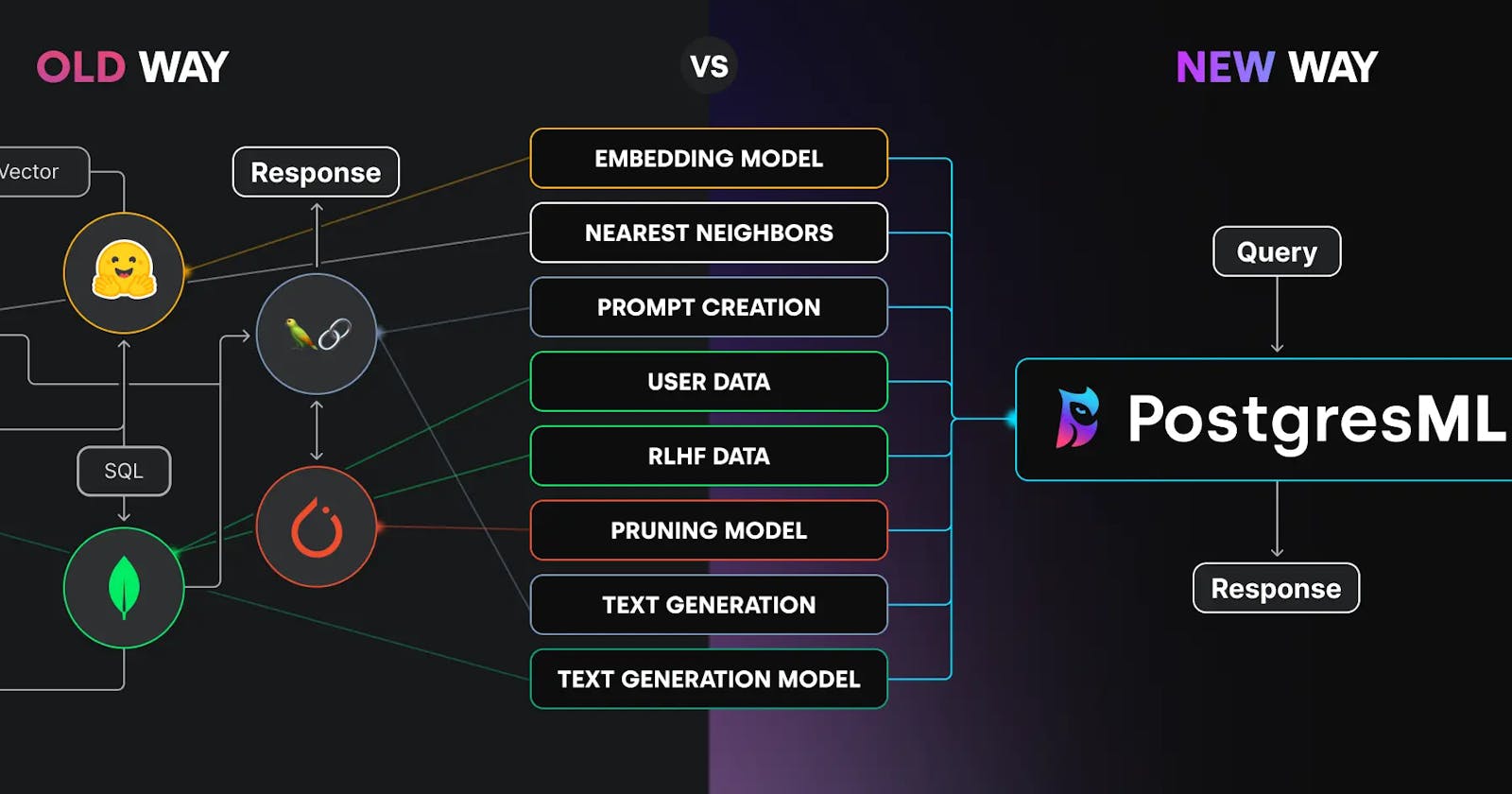PostgresML simplifies AI and ML integration into PostgreSQL, a popular open-source database, challenging the complexity typically associated with these technologies for businesses. This platform seamlessly incorporates AI and ML capabilities, offering familiar functionality and accessibility. Let's quickly deep dive into the platform's features, benefits, and real-world use cases.
Unveiling the Power of "In-database" AI:
Traditional AI deployments involve moving data to separate platforms, creating latency and security concerns. PostgresML breaks this mold by embedding AI functionality directly within the PostgreSQL database. This "in-database" approach offers several advantages:
Simplified Development:
With PostgresML, data scientists and developers can leverage their existing SQL skills to build and deploy AI models. This eliminates the need for learning complex AI frameworks or languages.
By writing SQL queries, you can create, train, and perform inference on machine learning models directly within the PostgreSQL environment.
-- Train a model SELECT pgml.train ( 'Sales Forecasting', task => 'regression', relation_name => 'hist_sales', y_column_name => 'next_sales', algorithm => 'xgboost' ); -- Deploy the model SELECT pgml.deploy ( 'Sales Forecasting', strategy => 'best_score', algorithm => 'xgboost' ); -- Make predictions SELECT pgml.predict ( 'Sales Forecasting', ARRAY [last_week_sales, week_of_year] ) AS prediction FROM hist_sales ORDER BY prediction DESC;
Enhanced Performance:
Traditional AI deployments involve moving data between different platforms, resulting in latency and performance bottlenecks.
PostgresML breaks this mold by allowing you to process data and models within the database. This significantly reduces data movement overhead. As a result, you get faster insights and predictions due to streamlined processing.
Improved Security:
Keeping data and models within the trusted environment of the database enhances security and data privacy.
By embedding AI functionality directly in PostgreSQL, you avoid unnecessary data transfers to external systems, reducing the risk of data exposure.
Key Features of PostgresML:
Model Serving:
PostgresML provides a GPU-accelerated inference engine within the database. This allows interactive applications to perform predictions without additional networking latency or reliability costs.
You can serve machine learning models directly from PostgreSQL, making real-time predictions efficient and seamless.
Model Store:
Download open-source models, including state-of-the-art language models (LLMs) from HuggingFace, and track changes in performance between different versions.
The model store functionality ensures easy access to pre-trained models and simplifies model management.
Model Training:
Train models using more than 50 algorithms for regression, classification, or clustering tasks.
Fine-tune pre-trained models like LLaMA and BERT using your application data to improve performance.
Feature Store:
PostgresML offers a scalable feature store that provides access to various model inputs:
Vector data: Efficiently store and retrieve vector representations.
Text data: Perform text search and handle textual features.
Categorical and numeric data: Manage diverse data types within a single low-latency system.
Integration with PostgreSQL Ecosystem:
PostgresML extends the capabilities of PostgreSQL, allowing you to define custom data types, index types, functions, operators, aggregates, and languages.
It seamlessly integrates with other trusted PostgreSQL extensions like pgvector and pg_partman.
Efficient and Reliable:
No additional infrastructure or networking latency: PostgresML enables machine learning directly within the database, eliminating the need for data movement.
GPU support: Leverage GPUs for accelerated computations without external dependencies.
Native Language SDKs:
PostgresML provides JavaScript and Python SDKs generated from the core Rust SDK. These SDKs allow advanced machine learning tasks in a single SQL request.
Examples include chat with streaming responses from LLMs, text generation with RAG, translation between language pairs, summarization, and forecasting time series data.
Benefits for Businesses:
Customization and Permissive License:
PostgresML is built on PostgreSQL, an open-source relational database system.
Its simple and permissive license allows organizations to customize and extend it according to their specific needs.
Unlike some other databases, there are no restrictive licensing fees, giving businesses the freedom to innovate without constraints.
Dependability and Resilience:
PostgreSQL has a proven track record of reliability and robustness.
It ensures data integrity and offers features like ACID compliance (Atomicity, Consistency, Isolation, Durability).
Businesses can rely on it for critical applications and data storage.
Scalability and Flexibility:
PostgresML accommodates a wide variety of data formats, making it suitable for diverse use cases.
Whether structured, semi-structured, or unstructured data, PostgreSQL handles it efficiently.
As your business grows, PostgreSQL scales seamlessly to meet increasing demands.
Security and Correctness:
With over 20 years of active community work, PostgreSQL is a secure and trusted database management system.
It adheres to the CIA triad (Confidentiality, Integrity, Availability) and provides robust security features.
Businesses can confidently manage sensitive data within PostgreSQL.
Regular Releases and Features for Developers:
PostgreSQL has a vibrant community that actively contributes to its development.
Regular releases introduce new features, enhancements, and optimizations.
Developers benefit from features like geographic objects, advanced data types (such as JSON), and more.
Cloud-Hosted Options:
Several companies offer cloud-hosted PostgreSQL databases, allowing businesses to focus on their applications rather than infrastructure management.
The combination of open-source flexibility and cloud convenience makes PostgreSQL an attractive choice for modern businesses.
Example Use Cases:
Retail: Predict customer churn and personalize product recommendations using customer data and purchase history.
Finance: Detect fraudulent transactions in real-time by analyzing financial data and user behavior.
Manufacturing: Predict equipment failures and schedule preventive maintenance using sensor data and historical maintenance records.
Healthcare: Analyze medical images for disease detection and personalize treatment plans based on patient data.
Diagram:
Here's a simplified diagram illustrating the PostgresML ecosystem:
+--------------------+
| Postgres Database |
+--------------------+
|
v
+--------------------+
| PostgresML Plugin |
+--------------------+
|
v
+--------------------+
| AI/ML Models |
+--------------------+
|
v
+--------------------+
| Data Preprocessing |
+--------------------+
|
v
+--------------------+
| External Data |
+--------------------+
|
v
+--------------------+
| Insights & |
| Predictions |
+--------------------+
The Future of In-database AI:
PostgresML represents a significant step towards democratizing AI and ML. By simplifying development and leveraging existing infrastructure, it empowers businesses to extract deeper insights from their data and unlock the potential of AI. As the platform continues to evolve and integrate with more AI tools and functionalities, it's likely to play a crucial role in shaping the future of AI adoption across diverse industries.
